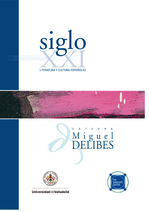"It's about money, always about money." Social exclusion, female agency and family ties in Las maravillas, by Elena Medel
DOI:
https://doi.org/10.24197/sxxi.20.2022.35-60Keywords:
Elena Medel, Las maravillas, social exclusion, female agency, family tiesAbstract
The article proposes that Las maravillas (2020), by Elena Medel, shows the double social exclusion to which working women in Spain have been subjected, not only because of their status as women, but because they are poor. Likewise, it is desired to demonstrate that Medel's text puts on stage the ability of this social group to reflect on its precarious situation, organize itself and face said exclusion, all thanks to the emergence of female agency. Finally, the novel also affects the permeability of these women's family ties, which are redefined by the social class to which they belong.
Downloads
References
Badinter, Elizabeth (1980), ¿Existe el amor maternal? Historia del amor maternal. Siglos XVIII al XX, Barcelona, Paidós.
Badinter, Elizabeth (2017), La mujer y la madre, Madrid, La esfera de los Libros.
Benítez Pérez, María Elena (2011), “La familia: desde lo tradicional a lo discutible”, Novedades en población, 26, pp. 58-68. http://scielo.sld.cu/pdf/rnp/v13n26/rnp050217.pdf
Belvedresi, Rosa (2018), “Historia de las mujeres y agencia femenina: algunas consideraciones epistemológicas”. Epistemología e Historia de la Ciencia, 3, 1, pp. 5-17.
Berger, Peter; Luckman, Thomas (1968), La construcción social de la realidad, Buenos Aires, Amorrortu.
Butler, Judith (2010), Mecanismos psíquicos del poder, Madrid, Cátedra.
Cháneton, July (2007). Género, poder y discursos sociales, Buenos aires, Eudeba.
Donath, Ornath (2017), Madres arrepentidas. Una mirada radical a la maternidad y sus falacias sociales, Barcelona, Resevoir Books.
Foucault, Michel (1996), Hermenéutica del sujeto, La Plata, Altamira.
Grunner, Eduardo (1991), “Las fronteras del (des)orden”, en A. Borón (comp.), El menemato. Radiografía de dos años de gobierno de Carlos Menem, Buenos Aires, Ediciones Letra Buena, pp. 87 -118.
hooks, bell (2017), El feminismo es para todo el mundo, Madrid, Traficante de Sueños.
Illouz, Eva. y Kaplan, Dana (2020), El capital sexual en la Modernidad tardía, Barcelona, Herder.
XXX (2021), “Transfobia, maternidad protésica e identidades no heteronormativas en Loxoro (2011) de Claudia Llosa”, Letras, 92, 13, pp. 146-159. https://doi.org/10.30920/letras.92.135.11
Ludmer, Josefina (1985), “Las tretas del débil”, en Patricia González y Eliana Ortega (eds.), La sartén por el mango. Encuentro de escritoras latinoamericanas. Puerto Rico, Ediciones El Huracán, pp. 47-54.
Kristeva, Julia (1987), Historias de amor, México, Siglo Veintiuno.
McIntosh, Peggy (1988), “White privilege and male privilege: a personal account of coming to see correspondences through work in women's studies”, Center of Research on Women, 1988, pp. 1-20.
Mahmood, Saba (2001), “Feminist Theory, Embodiment, and the Docile Agent: Some Reflections on the Egyptian Islamic Revival”. Cultural Anthropology, 16, 2, pp. 202-236. https://doi.org/10.1525/can.2001.16.2.202
MacKinnon, Catharine (2014), Feminismo modificado. Discursos sobre la vida y el derecho, Buenos Aires, Siglo Veintiuno.
Medel. Elena (2020), Las maravillas, Barcelona, Anagrama.
Menéndez, M.I. “Cosificación”, en Rosa Cobo y Beatriz Ranea (eds.), Breve diccionario de feminismo, Madrid, Los libros de la Catarata, pp. 61-63.
Palomar, Cristina (2004), “Malas Madres: la construcción social de la maternidad”, Debate Feminista, 30, pp. 12-34.
Pateman, Carole (1995), El contrato sexual. Barcelona: Anthropos: México, Universidad Autónoma Metropolitana – Iztapalapa.
Platero Sanz, Rebeca (2014), “La poesía actual escrita por mujeres”. Trabajo de fin de grado. Universidad de Valladolid. https://uvadoc.uva.es/bitstream/handle/10324/8248/TFG_F_2014_74.pdf;jsessionid=397FC71848D394FC693A5A51DB1E2E01?sequence=1
Recalcati, Massimo (2018), Las manos de la madre. Deseo, fantasmas y herencia de lo materno, Barcelona, Anagrama.
Ribeiro, Djamila (2021), Lugar de enunciación, Lima, Gafas moradas.
Rose, Jackeline (2018), Madres. Un ensayo sobre la crueldad y el amor. Madrid, Siruela.
Rotondi, Gabriela (2007), “Exclusión social”, en Susana Beatriz (coord.), Diccionario de estudios de género y feminismos, Buenos Aires: Editorial Biblos, pp. 128-130.
Silva Santisteban, Rocío (2006), “Spivak, los subalternos y el Perú”. Hueso Húmero, 29, pp. 133-144.
Scarano, Laura (2021), “Elena Medel: ‘Hablo el idioma de las mujeres que me fueron’”. Caracol, 21, pp. 75-99. https://www.revistas.usp.br/caracol/article/view/178418
Sen, Amartya (1985), “Well-being, Agency and Freedom: The Dewey Lectures 1984”. The Journal of Philosophy, 82, 4, pp. 169-221. https://doi.org/10.2307/2026184
Wolf, Sun (2008), Peer groups: expanding our study of small group communication, Thousand oaks, CA: Sage.
Downloads
Published
Versions
- 2022-10-11 (2)
- 2022-10-11 (1)
Issue
Section
License
Copyright (c) 2022 Richard Angelo Leonardo-Loayza

This work is licensed under a Creative Commons Attribution-NonCommercial 4.0 International License.
The articles published at XXI Century. Spanish Literature and Culture will have a Creative Commons Attribution 4.0 International License (CC BY 4.0).
The journal allows the authors to retain publishing rights. Authors may reprint their articles in other media without having to request authorization, provided they indicate that the article was originally published in XXI Century. Spanish Literature and Culture.


